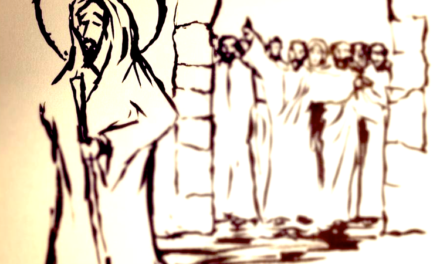The Book of Genesis is focused on God’s relationship with the nation of Israel. God’s calling of Abram in Genesis 12 revealed God’s purpose to restore His relationship with humanity with a focus on one family, Abram. Abram’s background tied up with all the previous generations including his father Terah, worshipped false gods. While Ur and Haran, Abram’s former and current homes were centres of worship of the moon (Jos 24:2). The story of Abram reminds us of the Creative God and the barren family. Abram, prior to his calling by God was pagan and was married to Sarai but they were barren.
In their barrenness, God shows up with an amazing, in-breaking words, commands, and promises: “The Lord said to Abram, ‘Leave your country, your people, and your father’s household and go to the land I will show you.” God’s two-sided instruction to ‘leave’ and ‘go to,’ calls for a faithful obedience to an unknown destination which God will show him. The reflection is, we cannot stay in our sinful practices and still obey God just as Abram could not stay in Haran and still obey God. Abram was called to leave his pagan culture in order to commit himself to the Lord, just as Lenten journey calls us to leave our culture of unbelief, pride, immorality, denial, and hypocrisy in order to overcome our missional barrenness and decline and become God’s vessel of effective mission and righteousness. Walter Brueggemann writes, “Barrenness is not only the condition of hopeless humanity. The marvel of biblical faith is that barrenness is the arena of God’s life-giving action.” It is very tragic to remain adamant, unyielding to God’s voice and at the same time promoting idolatry shaped by barren lifestyle.
In his faithful obedience to God’s commands, the great patriarch Abram at 75 stepped into the unknown leaving everything that was safe and familiar, his comfort zone, his home, his friends, his country, his people, to journey to an unknown land. God is calling you and I, the church and our nations to uproot ourselves and leave our country – of sin, barrenness, decline, unbelief, and travel with Him into the unknown. Lenten journey to ‘leave our country’ calls for a change, to leave that lifestyle and practices of barrenness and set off by faith into land and mission of hope, of promise, of blessing. Abram, who was later to become Abraham, was chosen by God to father a great nation. Lenten journey to ‘leave your country,’ is about obeying God’s voice in getting us out of that which could stifle our ministry, churches, nations blessings, stunt our growth and stagnate our life and leadership. Lenten journey to ‘leave your country’ warns us not to keep promoting, practising and holding on to that which is holding us, the church and the nations up.
Lenten journey to ‘leave your country’ is a journey towards the experience of the cross, a death to self, death to immorality, death to unbelief, a death not ending in death, physical or spiritual, but in eternal life. Lenten journey to ‘leave your country’ is a journey and discipline towards righteousness. Righteousness is born out of the saving faith that God can do what He promises. Righteousness is born out of the redeeming faith that God gives life to the dead, and calls into existence things that do not exist. Our righteousness is born out of the fact that God—even in our barrenness—is at work blessing us so that we might be blessed and become a blessing to others.
Lenten journey in response to God’s word to ‘leave your country’ of barrenness offers opportunities in learning missional principles from Abram’s call. Lenten journey gives us new missional direction, a release and separation from every sinful relationship and world system that could keep God from working out His purpose for our lives, churches and nations (2 Cor 6:17-18). The truth is that the world system and even leadership is temporary and will pass away (1Jn 2:15-16, Rev 18:2, Da 2:34-35, 2Thess 1:7-10). The concept of separation from evil – from all that contradicts, opposes and defies God’s character, standards and purposes is fundamental to God’s relationship with His people. Missional separation involves two dimensions – one negative, what we must avoid and not do, and the other positive, what we should seek after or must do. Missional separation does not mean refusing to communicate with or reach out to others even of different faith.
Abraham believed, and among the consequences of his believe is the promise fulfilled in the well-known verse of John Gospel, “God so loved the world that He gave His only Son …” (Jn 3:16). Lenten journey is about the fulfilment of the promises by spreading the message of Jesus Christ around the world (Acts 3:25, Gal 3:8). Lenten journey reminds us as an alien, a stranger on earth that our ultimate home is not on earth but in heaven. Lenten journey beyond the promises demands some missional obligations, undivided commitments to God through saving faith. Nicodemus, also at an old age, a pious and knowledgeable teacher, a Pharisee and a member of the Jewish Sanhedrin provides another model of Lenten journey. Unlike Abram, Nicodemus, a kind of ‘almost a Christian’ from an important aristocratic family and authority on Scripture lived in the City of David, called Jerusalem. He yearn to see Jesus hence his coming at night to see Jesus may be because of the darkness of his own great sin, among others. Nicodemus provides the link between the best in Judaism of his time and the Church of the future and the Kingdom of God (John 3: 5). For Nicodemus in us, the Lenten journey is about leaving our country of a pious and knowledgeable teacher and preacher, our country and membership of barren leadership for a fruitful and regenerated encounter through the power of the Holy Spirit. Nicodemus was confused as many are confused today in their barren country about being ‘born again’ in a spiritual sense. Jesus made the point to Nicodemus that he must be born of the Spirit in order to understand the spiritual things of God. The principal barrenness in the church today is the barrenness of understanding the spiritual things of God, the barrenness of hearing voices, believing promises, obeying commands, and winning soul for Christ.
Just as in Abram’s country of Ur and Haran, where most people believe in many gods shaped by many forces, Nicodemus in his aristocratic family points to an unfruitful lifestyle with no missional sense of direction and purpose. Jesus makes the Sanhedrin wary, because he threatens their power. Like Abraham and Nicodemus at crossroads, we need to ‘leave our country’ of unfruitfulness and unfaithfulness in order to respond in faith and to be faithful and fruitful especially in God’s mission. Lenten journey is about seeking God’s grace to walk away from our Haran, our comfort zones. The calls upon Abraham and Nicodemus to take a leap in the dark, to accept God’s commands on the basis of trust resonates with the Lenten journey to us to ‘leave your country,’ from any path of rebellion against God to a new obedience to Jesus Christ.











Recent Comments